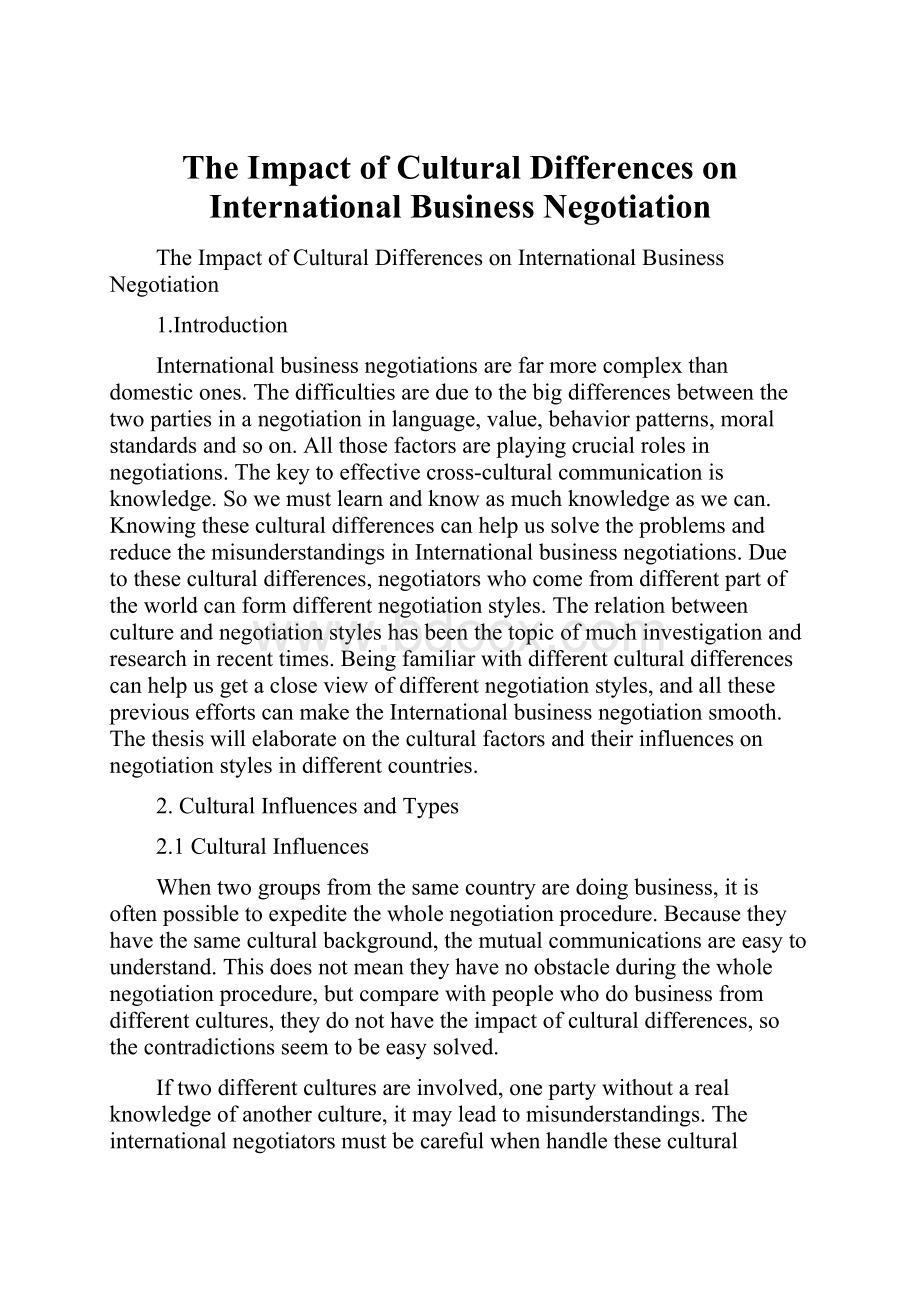The Impact of Cultural Differences on International Business Negotiation.docx
《The Impact of Cultural Differences on International Business Negotiation.docx》由会员分享,可在线阅读,更多相关《The Impact of Cultural Differences on International Business Negotiation.docx(12页珍藏版)》请在冰豆网上搜索。

TheImpactofCulturalDifferencesonInternationalBusinessNegotiation
TheImpactofCulturalDifferencesonInternationalBusinessNegotiation
1.Introduction
Internationalbusinessnegotiationsarefarmorecomplexthandomesticones.Thedifficultiesareduetothebigdifferencesbetweenthetwopartiesinanegotiationinlanguage,value,behaviorpatterns,moralstandardsandsoon.Allthosefactorsareplayingcrucialrolesinnegotiations.Thekeytoeffectivecross-culturalcommunicationisknowledge.Sowemustlearnandknowasmuchknowledgeaswecan.KnowingtheseculturaldifferencescanhelpussolvetheproblemsandreducethemisunderstandingsinInternationalbusinessnegotiations.Duetotheseculturaldifferences,negotiatorswhocomefromdifferentpartoftheworldcanformdifferentnegotiationstyles.Therelationbetweencultureandnegotiationstyleshasbeenthetopicofmuchinvestigationandresearchinrecenttimes.Beingfamiliarwithdifferentculturaldifferencescanhelpusgetacloseviewofdifferentnegotiationstyles,andallthesepreviouseffortscanmaketheInternationalbusinessnegotiationsmooth.Thethesiswillelaborateontheculturalfactorsandtheirinfluencesonnegotiationstylesindifferentcountries.
2.CulturalInfluencesandTypes
2.1CulturalInfluences
Whentwogroupsfromthesamecountryaredoingbusiness,itisoftenpossibletoexpeditethewholenegotiationprocedure.Becausetheyhavethesameculturalbackground,themutualcommunicationsareeasytounderstand.Thisdoesnotmeantheyhavenoobstacleduringthewholenegotiationprocedure,butcomparewithpeoplewhodobusinessfromdifferentcultures,theydonothavetheimpactofculturaldifferences,sothecontradictionsseemtobeeasysolved.
Iftwodifferentculturesareinvolved,onepartywithoutarealknowledgeofanotherculture,itmayleadtomisunderstandings.Theinternationalnegotiatorsmustbecarefulwhenhandletheseculturaldifferencesanddonotusethesamewaylikenegotiatewithlocalbusinesspersons.
Agreatnumberofrealcasesshowthatduetomisunderstandings,manybusinesseswerelost.Forexample,anAmericanbusinessmanoncepresentedaclocktothedaughterofhisChinesecounterpartontheoccasionofhermarriage,notknowingthatclocksareinappropriategiftsinChinabecausetheyareassociatedwithdeath.Hisinsultledtotheterminationofthebusinessrelationship.ItisalsobadformtogivethegiftsofgreatvaluetotheJapanesethanthosereceived.
Asaninternationalbusinessnegotiator,heorshemusttryhisbesttolearnandknowtheculturedifferencesinordertoavoidsomemistakesandthroughtheculturalexchangetoestablishagoodcooperationrelationshipwithhispartners.
2.2CulturalTypes
Beliefsandbehaviorsaredifferentfromdifferentcultures,becauseeachdevelopsitsownmeansofexplainingandcopingwithlife.Fourculturaldimensionscanhelptoexplainthedifferencesbetweencultures.Thoughthedistinctionsbetweenthemseemclear,thedimensionshouldberegardedasageneralguide.Thefourdimensionsaregender,uncertaintyavoidance,powerdistanceandindividualism.
Genderculturescanbedividedintomasculineandfemininetypes.Masculineculturestypicallyvalueassertiveness,independence,taskorientationandself-achievement.Masculinesocietiestendtohavearigiddivisionofsexroles.Thecompetitivenessandassertivenessembeddedinmasculinesocietiesmayresultinindividualsperceivingthenegotiationsituationinwin-or-loseterms.Inmasculinecultures,thepartywiththemostcompetitivebehaviorislikelytogainmore.
Feminineculturesvaluemodesty,cooperation,nurturingandsolidaritywiththelessfortunate.Femininityisrelatedtoempathyandsocialrelations.
UncertaintyavoidanceThistermreferstohowuncomfortableapersonfeelinriskyorambiguoussituations.Inhighuncertaintyavoidancecultures,peopletendtoavoidtensesituations.Theseculturestendtoobserveformalbureaucraticrules,relyonritualsandstandards,andtrustonlyfamilyandfriends.
Inlowuncertaintyavoidancecultures,peoplearegenerallymorecomfortablewithambiguoussituationsandaremoreacceptingofrisk.Lowriskavoidersrequiremuchlessinformation,havefewerpeopleinvolvedinthedecision-making,andcanactquickly.Suchculturesdislikehierarchyandtypicallyfinditinefficientanddestructive.Devianceandnewideasaremorehighlytolerated.Culturescharacterizedbylowuncertaintyavoidancearelikelytopursueproblem-solvingsolutionsratherthanmaintainthestatusquo.
PowerdistancePowerdistancereferstotheacceptanceofauthoritydifferencesbetweenpeople—thedisparitybetweenthosewhoholdpowerandthoseaffectedbypower.Highpower-distanceculturesarestatusconsciousandrespectfulofageandseniority.Inhighpower-distancecultures,outwardformsofstatussuchasprotocol,formality,andhierarchyareconsideredimportant.Decisionsregardingrewardsandredressofgrievancesareusuallybasedonpersonaljudgmentsmadebypowerholders.Whensomeonefromahigh-masculinitycultureattemptstoworkwithsomeonefromahighpower-distanceculturewithouteitherpartyrecognizingthevariationsintheirrespectivebehaviors,clashesarelikelytodisruptnegotiations.Inlowpower-distancecultures,peoplestriveforpowerequalizationandjustice.Alowpower-distanceculturalvaluescompetenceoversenioritywitharesultingconsultativemanagementstyle.Lowmasculinityandlowpowerdistancemayberelatedtothesharingofinformationandtheofferingofmultipleproposalsaswellasmorecooperativeandcreativebehavior.
IndividualismInindividualismcultures,peopletendtoputtasksbeforerelationshipsandtovalueindependencehighly.Peopleintheseculturesareexpectedtotakecareofthemselvesandtovaluetheneedsoftheindividualoverthoseofthegroup,community,orsociety.Individualisticculturespreferlinerlogicandtendtovalueopenconflict.Membersfromindividualisticsocietiesexpecttheotherside’snegotiationtohavetheabilitytomakedecisionunilaterally.
Bycontrast,culturesthatvaluecollectivismemphasizesolidarity,loyalty,andstronginterdependenceamongindividuals.Relationshipsarebasedonmutualself-interestandaredependentonthesuccessofthegroup.Collectivistculturesdefinethemselvesintermsoftheirmembershipwithingroups.Maintainingtheintegrityofgroupsisstressedsothatcooperation,conflictavoidance,andconformitydominatetheculture.Collectivistsocietiestendtostressabstract,generalagreementsoverconcrete,specificissues.
Collectivistnegotiatorstendtoassumethatdetailscanbeworkedoutifthenegotiatorscanagreeongeneralities.Collectivistsocietiesshowmoreconcernfortheneedsoftheotherpartyandfocusmoreongroupgoalsthanindividualisticsocietiesdo.Membersofcollectivistsocietieschafewhenmembersfromindividualisticsocietiespromotetheirownpositionsandideasduringnegotiations.
3.TheRelevantCulturalFactors
Intermsofinternationalbusinessnegotiation,thefollowingelementsofculturearegenerallybelievedtohaveanimportantimpactoninternationalbusinessnegotiation.Knowingmuchrelevantknowledgeofdifferentculturescanmaketheinternationalbusinessnegotiationsmooth.
3.1LanguageandCommunication
Thewaysinwhichpeoplecommunicate,includingusingverbalandnon-verballanguage,directlyaffectsinternationalbusinessnegotiation.Whenwecommunicatewithpeoplefromothercultures,ourbodylanguagesometimeshelpsmakethecommunicationeasierandmoreeffective,suchasbyshakinghandswhengreetingothers.Thishasbecomesuchauniversalgesturethatpeopleallovertheworldknowthatitisasignalforgreeting.
Sometimes,bodylanguagecanbemoreofahindrancethanafavor.Itcanleadtomisunderstandingsincepeopleofdifferentculturesoftenhavedifferentformsofbehaviorforsendingthesamemessage.Forexample,noddingone’sheadisgenerallymeanttoshowagreement,toindicate‘yes’.TotheNepaleseandSriLankans,however,itmeantnot‘yes’,but‘no’.
So,asamasterhand,hemusttryhisbesttoknowasmuchasinformationofhiscounterpart,theproficiencyoflanguagesandnegotiationtechniquesarenotenough,healsoneedstohavesomemasteryofthenon-verbalbehaviorofdifferentcultures.Peopleusebodylanguagesmorefrequentlyindailylife.Excellentlanguageandcommunicationcanhelpusmakesuccess.
3.2Values
Valuesarethestandardsbywhichacultureevaluatesactionandtheirconsequences.Theyaffectperceptionandcanhaveastrongemotionalimpactuponpeople.Indifferentcultures,valuesmayvarysignificantly.One’sproperactionsinoneculturecanbeseenaswronginamoralsenseinanotherculture.
Thus,itisimportanttounderstandtheprevailingvaluesinaparticularsocietyandtheextenttowhichtheyarerespectedintheeverydaybehaviorofindividuals.Valuesaffectthewillingnesstotakerisks,theleadershipstyleandthesuperior-subordinaterelationships,etc.Thisistruefortherelationshipsbetweennegotiatorswithineachteam.Everyculturehasdefinedprioritiesforeveryaspectofsociallife.Thediscussionherewillfocusonvaluescriticalforunderstandingtheeconomicperformanceofasociety,morespecifically,andthevaluethatdeserveattentioninordertodevelopinterculturalcommunicationskills.
3.2.1ValuetowardsTime
Valuetowardstimeandhowtheyshapethewaypeoplestructuretheiractionshaveapervasiveyetinvisibleinfluenceoninternationalbusinessnegotiation.Differencesinpunctuality,reflectedineverydaynegotiationbehavior,mayprobablyappearasthemostvisib